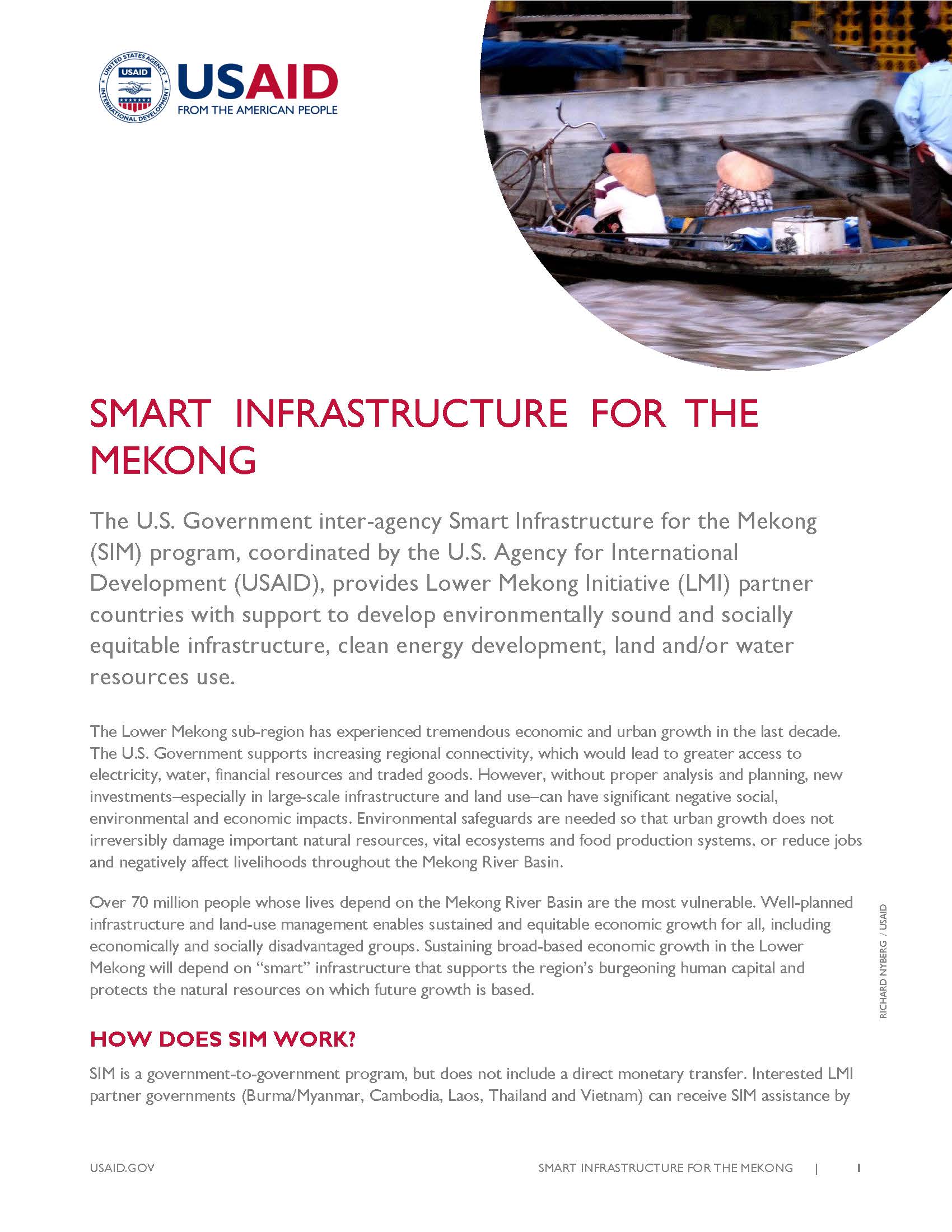The U.S. Government inter-agency Smart Infrastructure for the Mekong (SIM) program, coordinated by the U.S. Agency for International Development (USAID), provides Lower Mekong Initiative (LMI) partner countries with support to develop environmentally sound and socially equitable infrastructure, clean energy development, land and/or water resources use.
The Lower Mekong sub-region has experienced tremendous economic and urban growth in the last decade. The U.S. Government supports increasing regional connectivity, which would lead to greater access to electricity, water, financial resources and traded goods. However, without proper analysis and planning, new investments–especially in large-scale infrastructure and land use–can have significant negative social, environmental and economic impacts. Environmental safeguards are needed so that urban growth does not irreversibly damage important natural resources, vital ecosystems and food production systems, or reduce jobs and negatively affect livelihoods throughout the Mekong River Basin.
Over 70 million people whose lives depend on the Mekong River Basin are the most vulnerable. Well-planned infrastructure and land-use management enables sustained and equitable economic growth for all, including economically and socially disadvantaged groups. Sustaining broad-based economic growth in the Lower Mekong will depend on “smart” infrastructure that supports the region’s burgeoning human capital and protects the natural resources on which future growth is based.
HOW DOES SIM WORK?
SIM is a government-to-government program, but does not include a direct monetary transfer. Interested LMI partner governments (Burma/Myanmar, Cambodia, Laos, Thailand and Vietnam) can receive SIM assistance by developing a concept note and submitting it to the local U.S. Embassy for review. LMI partner governments then receive assistance and services from U.S. Government technical experts after a review process that involves both sides developing and agreeing on a scope of work, schedule and cost estimate.
LMI countries can request SIM support for a range of activities:
- Engineering support to incorporate environmental impact mitigation measures into road, dam, land-use or construction activities;
- Technical support for hydrological monitoring, climate change vulnerability modeling, geospatial land-use analysis, clean energy planning and other technical assessments;
- Training for decisionmakers on environmental and social impact assessments and public participation processes; and
- Financial analyses of economic scenarios and innovative finance and design alternatives for smart infrastructure, clean energy, and land and/or water resources use decision-making.
IMPACT AND RESULTS
Through SIM activities, the U.S. Government works hand-in-hand with LMI partner governments to promote sustainable and equitable green growth. The program has conducted over 30 technical assistance missions in four countries, fielded 41 U.S. Department of Interior scientists, engineers and other technical experts and trained over 600 officials.
Notable achievements include strengthening Vietnam’s landmark Mekong Delta Study on the impact of hydropower developments, sending environmental law and policy experts to the field in support of Cambodia’s environmental code reform, developing technical review guidelines for sediment management and dam safety for the Laos Ministry of Energy and Mines and advancing fish passage technology and fish biology research in the region.
ADDITIONAL INFORMATION
Please refer to the LMI Coordination Hub website (www.lowermekong.org) for information on the technical services available through SIM, detailed guidance for developing a concept note, and a complete list of SIM conditions and criteria.
Partners Under USAID funding and coordination, partners include the U.S. Department of State, U.S. Department of the Interior, U.S. Army Corps of Engineers, U.S. Department of Energy, U.S. Fish and Wildlife Service, U.S. Forest Service, U.S. Geological Survey, Bureau of Land Management, as well as other agencies and technical entities.








Comment
Make a general inquiry or suggest an improvement.